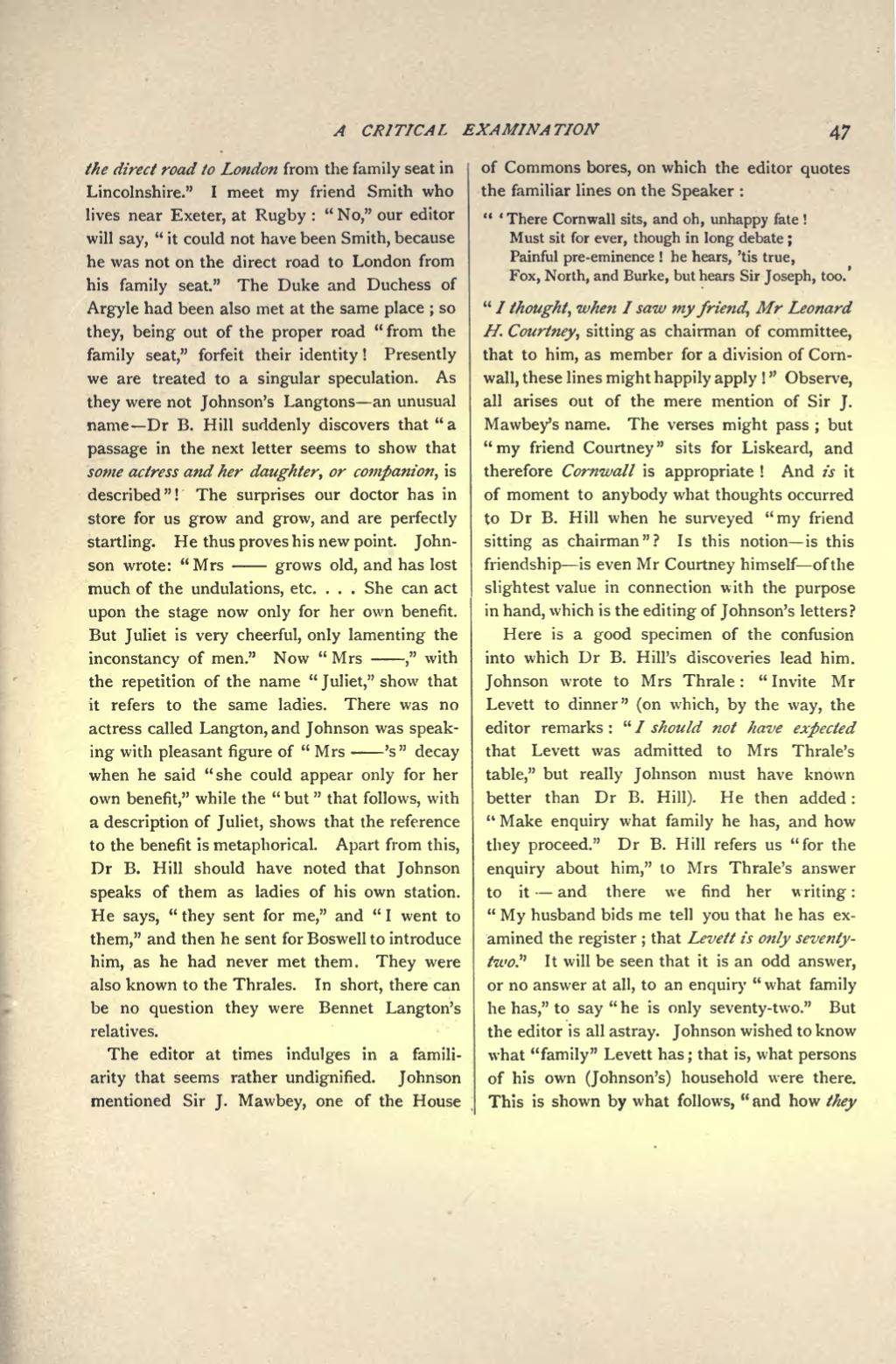the direct road to London from the family seat in Lincolnshire." I meet my friend Smith who lives near Exeter, at Rugby: "No," our editor will say, "it could not have been Smith, because he was not on the direct road to London from his family seat." The Duke and Duchess of Argyle had been also met at the same place; so they, being out of the proper road "from the family seat," forfeit their identity! Presently we are treated to a singular speculation. As they were not Johnson's Langtons an unusual name - Dr B. Hill suddenly discovers that "a passage in the next letter seems to show that some actress and her daughter, or companion, is described"! The surprises our doctor has in store for us grow and grow, and are perfectly startling. He thus proves his new point. Johnson wrote: "Mrs grows old, and has lost much of the undulations, etc. … She can act upon the stage now only for her own benefit. But Juliet is very cheerful, only lamenting the inconstancy of men." Now "Mrs ," with the repetition of the name " Juliet," show that it refers to the same ladies. There was no actress called Langton, and Johnson was speaking with pleasant figure of "Mrs 's decay when he said "she could appear only for her own benefit," while the "but " that follows, with a description of Juliet, shows that the reference to the benefit is metaphorical. Apart from this, Dr B. Hill should have noted that Johnson speaks of them as ladies of his own station. He says, "they sent for me," and "I went to them," and then he sent for Boswell to introduce him, as he had never met them. They were also known to the Thrales. In short, there can be no question they were Bennet Langton's relatives.
The editor at times indulges in a familiarity that seems rather undignified. Johnson mentioned Sir J. Mawbey, one of the House of Commons bores, on which the editor quotes the familiar lines on the Speaker:
"'There Cornwall sits, and oh, unhappy fate!
Must sit for ever, though in long debate;
Painful pre-eminence! he hears, 'tis true,
Fox, North, and Burke, but hears Sir Joseph, too.'
"I thought, when I saw my friend, Mr Leonard H. Courtney, sitting as chairman of committee, that to him, as member for a division of Corn wall, these lines might happily apply! " Observe, all arises out of the mere mention of Sir J. Mawbey's name. The verses might pass; but "my friend Courtney" sits for Liskeard, and therefore Cornwall is appropriate! And is it of moment to anybody what thoughts occurred to Dr B. Hill when he surveyed "my friend sitting as chairman"? Is this notion—is this friendship—is even Mr Courtney himself—of the slightest value in connection with the purpose in hand, which is the editing of Johnson's letters?
Here is a good specimen of the confusion into which Dr B. Hill's discoveries lead him. Johnson wrote to Mrs Thrale: "Invite Mr Levett to dinner" (on which, by the way, the editor remarks: "I should not have expected that Levett was admitted to Mrs Thrale's table," but really Johnson must have known better than Dr B. Hill). He then added: "Make enquiry what family he has, and how they proceed." Dr B. Hill refers us "for the enquiry about him," to Mrs Thrale's answer to it and there we find her writing: "My husband bids me tell you that he has ex amined the register; that Levett is only seventytwo." It will be seen that it is an odd answer, or no answer at all, to an enquiry " what family he has," to say " he is only seventy-two." But the editor is all astray. Johnson wished to know what "family" Levett has; that is, what persons of his own (Johnson's) household were there. This is shown by what follows, "and how they
